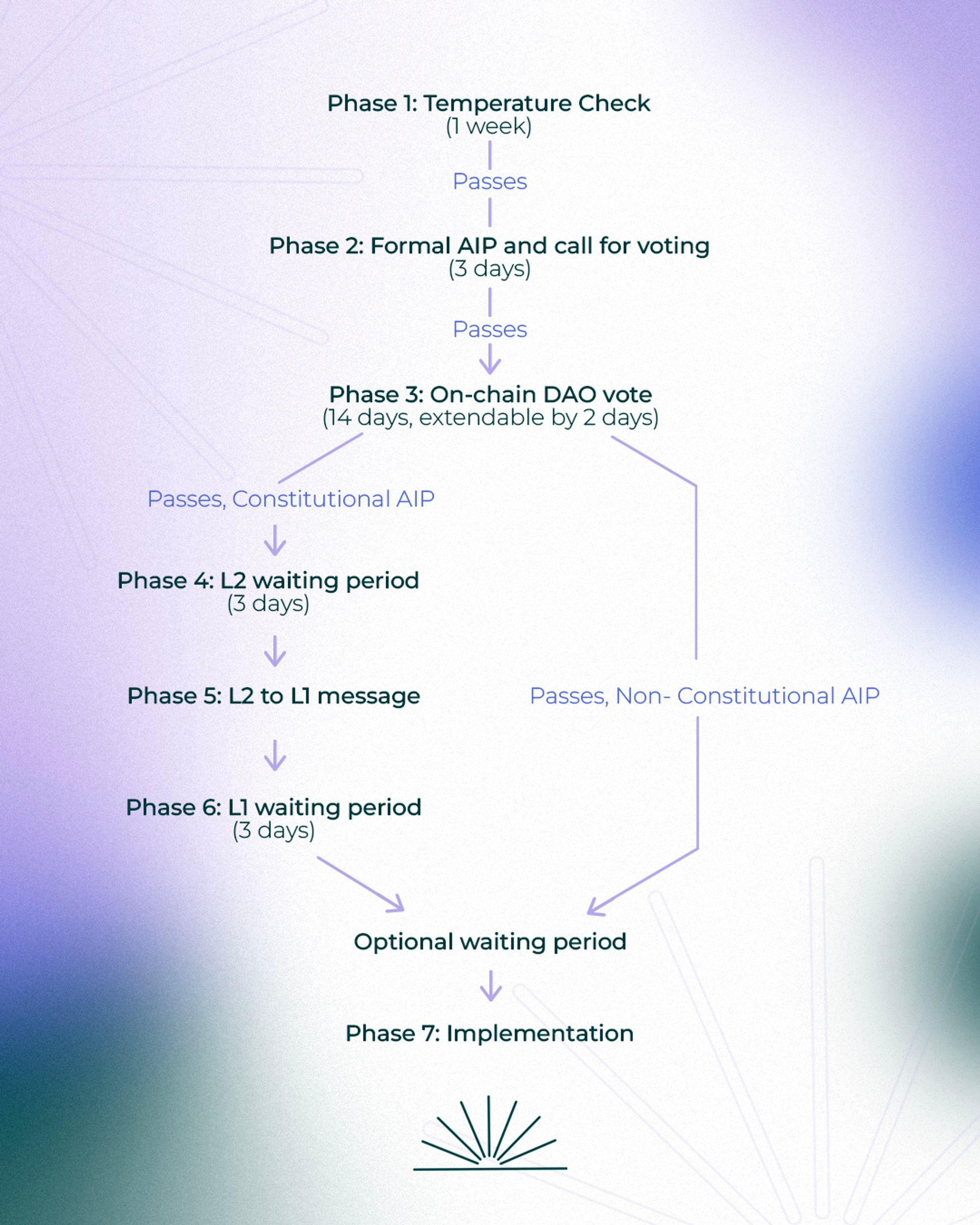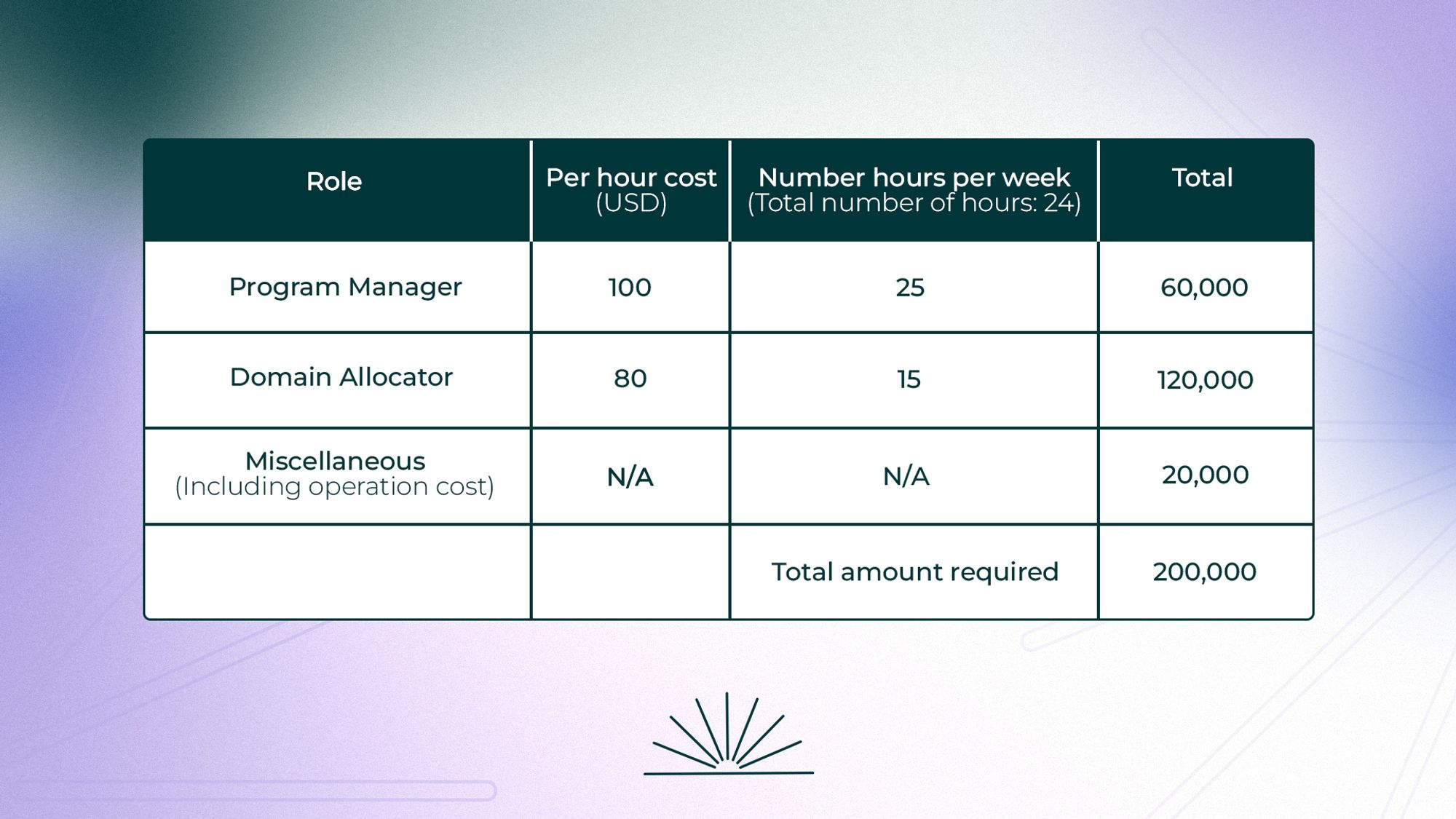Arbitrum
OffchainLabs is a New York-based company building Arbitrum, Arbitrum One, and Nova, Layer 2 scaling solutions for Ethereum. Arbitrum launched on Mainnet on August 31, 2021, and on August 31, 2022, Arbitrum One and Nova upgraded to Nitro tech stack.
In 2023, ArbitrumDAO was launched by airdropping $ARB, the ERC-20 governance token for Arbitrum Nova and Arbitrum One. The $ARB token allows holders to participate in the Arbitrum DAO's on-chain governance protocol by controlling protocol updates, funds and electing ArbitrumDAO’s Security Council.
This transfer of power included:
- Control of the upgradeability and technical future of the chains
- Control over the DAO treasury and net fee revenue - i.e., the net difference between fees collected by on-chain operations and L1 fees paid by the Sequencer
- All Arbitrum social media platforms and accounts
- Ability to elect and, if deemed appropriate, remove the Security Council and Directors
AIP-1
The Arbitrum Foundation submitted the AIP-1 proposal to delineate ArbitrumDAO's structure and governance rules. The community raised several transparency, accountability, and decentralization concerns.
Most importantly:
- The allocation of 1B dollars worth of tokens (7.5% of the total supply) to the Foundation's Administrative Budget Wallet. The Foundation needed to clarify who would sign for that wallet and how its money would be spent.
- The Security Council establishment did not clarify any election process.
The Foundation had begun selling $ARB tokens for stablecoins before its governance community of token holders had "ratified" the organization's nearly $1 billion budget.
AIP-1 did not pass. After AIP-1’s communication received negative feedback, the Foundation rectified decisions through AIP-1.1 Lockup, Budget, Transparency, where they clarified their processes and the next steps in the governance journey to the community.
ArbitrumDAO has quickly become one of the most engaged communities, with more than 633.43k token holders and 137.02k voters.
Arbitrum DAO Governance
Governance Framework

ArbitrumDAO's governance has three main bodies:
- The DAOis comprised of $ARB holders who vote to pass proposals.
- The Security Council can take action in two ways:
- Emergency actions: 9 of 12 multisig enables fast action in an emergency.
- Non-emergency actions: 7 of 12 multisig enables action for routine upgrades that bypass the need for DAO member voting
- The Security Council has the power to cancel or block proposals.
- Data Availability Committee: This committee stores data batches for transactions on the Arbitrum Nova chain on a specific server
(Data Availability Server)
Establishing the Arbitrum Foundation marked the initial phase of launching the DAO. Its primary objective is to serve the ArbitrumDAO community by guiding and facilitating the DAO’s decision-making. It also fosters the ecosystem development.
Governance is responsible for the following assets:
- Treasury - DAO holds and is responsible for a portion of $ARB tokens.
- Arb One Contracts and Arb Nova Contracts - Governance holds upgradability rights over these contracts on these contracts deployed on Ethereum Mainnet.
- Arb One and Arb Nova L2 parameters - All Arbitrum chains have a chain "owner" that can set specific parameters. Read more here. Governance has control over the chain owner.
- Governance contracts - Governance can upgrade and modify itself.
- Arbitrum Foundation Administrative Budget Wallet — See here for more info.
Governance specifications and details can be found in the Constitution.
Governance Proposals
Arbitrum Improvement Proposals
An Arbitrum Improvement Proposal (AIP)is submitted by a member of the Arbitrum DAO to modify to the Arbitrum ecosystem
There are two types of AIPs:
- Constitutional AIPs change the text or procedures of the Constitution or AIP-1, install or modify the software on any chain, or take any action that requires "chain owner" permission.
- Non-constitutional AIPs are all other AIPs, such as those that request funds/grants or provide general guidelines or information to the community.
Security Council Actions
The Security Council has the power to execute emergency actions and non-emergency actions. These differ from traditional AIPs because the Security Council can approve them without going through the above process
Governance Process and Mechanisms
Voting Power
The Arbitrum DAO may be new, but it has already gained a large and active community. With over 633.43k token holders and 137.02k voters, members are dedicated to advancing the goals of the Arbitrum Mission and the Ethereum ecosystem.
Voting Process
For proposals not enacted by The Security Council:
Step 1: Temperature check using Snapshot Poll
This preliminary vote gauges the community's interest in a proposal before it moves on to the next stage.
Step 2: Submit your on-chain proposal using Tally
To submit a proposal you need to have an Ethereum Wallet Address representing at least 1,000,000 tokens.
Today, 19 delegates can submit on-chain proposals to the Arbitrum DAO ecosystem.
To be approved, more than 50% of tokens must have voted in favor of the proposal:
- Constitutional AIPs must receive votes from at least 5% of all votable tokens;
- Non-constitutional AIPs must receive votes from at least 3% of all votable tokens.
The entire AIP voting process typically takes 34 days for Constitutional or 21 days for Non-Constitutional AIPs.

Delays and Waiting Periods
- All proposals, except those done by a 9/12 Security Council, will be subject to a series of delays: L2 timelock, withdrawal delay, and L1 timelock.
- Users can withdraw their assets from Arbitrum One or Nova before the execution of an accepted proposal.
- Anyone can monitor the execution process.
This process allows for thorough consideration and voting, ensuring everyone has a fair chance to voice their opinions and concerns.
Contribution Pathways
Any member of the community can contribute to the Arbitrum Ecosystem.
Ambassadors Program
You can become an ambassador for Arbitrum by joining “fleets” and representing Arbitrum in your local community, creating content, and leading meetups.
There will be two Phases to the Ambassador Program. Phase 1 is already in place and directed toward University-based Clubs and Students. Phase 2 will focus on contribution opportunities for users (Community Fleet) and developers (Technical Fleet). Phase 2 is expected before the end of the year.
Learn more here, read on the Ambassadors’ contributions and apply here.
Grants
Different grant programs exist within the Arbitrum Ecosystem. The Arbitrum Foundation runs Foundation Grants, while Arbitrum Grants DAO runs its initiatives separately.
DAO Grants
A group of contributors submitted a proposal to run the Arbitrum Grants DAO through working stream domain allocators. The grant would allocate funds to teams building apps on top of Arbitrum. The grant budget will be $1M with $200k for each domain. The proposal remains pending execution. Read the submission here.
Learn more about DAO grant proposals and ongoing discussions here.
Foundation Grants
Arbitrum Foundation launched a program to foster the Ecosystem’s growth and support DAO initiatives. Foundation Grants allocate funds to key Arbitrum initiatives. Current categories for this first phase of grants are dApps built across Arbitrum and Infrastructure and Tools. Learn more about Foundation Grants here.
Uniswap-Arbitrum Grant Program
This grant program launched in November 2023. Gitcoin's Grants Stack hosts the program as a direct grant and the program is managed by Uniswap DAO Working Group Zero.
The UAGP focuses on growing and advancing projects built exclusively within the Uniswap-Arbitrum ecosystem. Projects submitted must benefit both ecosystems.
5 categories are available
- Liquidity Management and Derivative Protocol
- Arbitrum testnet with EIP-1153 enabled
- Uniswap v4 Infrastructure Dev Tools
- Uniswap on Arbitrum Ecosystem tools or products
- Open Contribution, for applications not necessarily aligning with the previous four categories
The Questbook Arbitrum Grants program
This program is helpful for anyone developing domain-specific projects on top of Arbitrum. It includes four categories:
- Arbitrum Gaming
- Arbitrum new Protocols and Ideas
- Arbitrum Education, Community Growth, and Events
- Arbitrum Dev Tooling on One and NOVA
Through the program, you can receive milestone-based funding based on domain-specific needs outlined by the domain allocators elected by the community.
Learn more here
